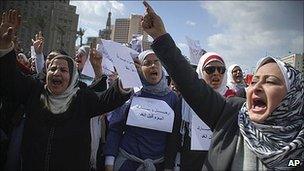Egypt's defiant women fear being cast aside
- Published

Egypt's women were on the front line of protests in Tahrir Square that led to the ousting of former President Hosni Mubarak, but they are becoming increasingly concerned that they are being sidelined as a new Egypt takes shape.
There are fewer women in the cabinet than under Mr Mubarak.
It is not clear whether there will be a women's quota in the new parliament as there was in the old. Women say the country's military rulers are overlooking them as they plan the new order.
What has provoked the most fury, however, is the treatment of women arrested in a protest in Tahrir Square in March.
Eighteen activists were arrested, of whom 17 say they were then badly mistreated including being forced to undergo virginity tests.
"There was a male doctor who examined us," said one of the protesters.
"We had to take off all our clothes. Then we realised some other soldiers were sneaking a look at us. I never imagined this could happen to me in Egypt, or anywhere in the world. I feel shamed."
Activists say the offence was compounded by comments from a senior Egyptian general recently reported by the US network CNN.
"These women were not like your daughter or mine," the channel reported him saying. "They were girls who had camped out in tents, with male protesters.
"We didn't want the women to say we had sexually assaulted or raped them. So we wanted to prove they weren't virgins in the first place."
The Egyptian military has since denied that virginity tests were carried out. But that has not satisfied women activists. The issue has only compounded fears that they are being squeezed out of the political dialogue.
Hoda Badran, chairwoman of the Alliance for Arab Women and a former senior UN official, was the headline speaker at a recent women's conference in Cairo, designed to make sure women's voices are not drowned out in the lively political debates now going on.
"Women went out to Tahrir Square, women participated in planning the revolution," she said.
"They cleaned the square, they nursed the wounded, they also were killed when people in the square were shot. But after the revolution we notice that there are decisions that are being taken to exclude women.
"We expected this revolution is going to include women as much as it includes men, in terms of liberty, in terms of equality, in terms of social justice. Apparently it is not."
Islamism
Others women's activists fear even worse - the increasing power of Islamists, forcing women back into a subservient role.
Gender studies expert Shaza Abdul-Latif said that would be a "nightmare".
"I am very very worried. The main problem is the religious parties that are suddenly appearing," she said.
"They look at us as if we are not Egyptians and we don't have religion."
Egyptian society has, by all accounts, been becoming steadily more conservative in recent years.
Some believe it is the result of the difficult economic times, causing Egyptian men to travel to the Gulf for work and bring back conservative attitudes.
Others suggest it is a reaction to the corruption that flourished in Hosni Mubarak's Egypt.
Whatever the cause, it has had its inevitable effect on the treatment and status of women. Literacy rates among women, for example, are notoriously low in Egypt.
On the face of it, nothing dramatic has changed in the past few months, despite the fall of President Mubarak.
A similar elite is still in power. Conservative generals, like those quoted by CNN, still have positions of authority.
The big difference, though, is that everything is now up for discussion. Open debate is flourishing.
On the internet and in newspapers a "culture war" has already opened up between those who want a liberal society and those who want a greater say for their conservative interpretations of Islam and Christianity.
The position of women in society is one of the most important topics for debate.
Shaza Abdul-Latif explained: "This is a very critical period in our history. We have a chance to change everything that is bad and related to the old system."